
Madam Speaker,
We are here today with a renewed focus, ready to expedite our legislative and policy agenda to continue to create a better country for all Bahamians.
Thank you to our Governor General, the Honourable Cynthia “Mother” Pratt, for her delivery of the Speech From the Throne outlining our priorities for this legislative session. She continues to be an inspiration to me and to our nation as an exemplary leader and stateswoman who has lived her life in service of others and now continues to serve her people as our Governor General.
As I stand here today in this Honourable House, I feel the absence of the Hon. Obadiah Wilchcombe. We are still a people in mourning after such an irreplaceable loss. This nation is better today because of the contributions made by our Honourable colleague. We must now honour his legacy by ensuring that our conduct and our priorities continue to reflect what is in the best interest of the Bahamian people. That is what Obie was all about as leader of government business in this House. His contributions are now a part of the permanent record of this House with the passage of the Resolution in his honour last week.
Madam Speaker,
Obadiah Wilchcombe had a profound belief in preserving the dignity of the Bahamian people which was evident in his approach to policymaking and implementation. His fingerprints could be found in our Blueprint for Change, and he continued to influence us as we took office in September 2021.
Just over two years ago, the new PLP administration took office facing a country that was in dire straits.
Our national debt was at the highest levels in our nation’s history – the debt-to-GDP ratio was over 100%. That means that for every dollar our economy was producing, we owed another dollar to a creditor.
Unemployment was at the highest level in our recorded history. Because of the lack of statistical collection during that period, we will never know how high it rose. But some projected that it was over 30% during the worst moments. That meant that roughly one out of every three Bahamian workers were out of work.
Our schools were closed and thousands of our children either dropped out completely or attended irregularly. Our hospitals were overcrowded and under-resourced.
And our communities were still burdened with strict curfews and extreme, inflexible rules that did not give our people and our businesses room to recover and grow.
What I’m describing is a time of crisis – a time when our nation fell under the inadequate rule of one man whose dogmatic, dictatorial approach to governing was not serving the interests of the Bahamian people.
Two years ago, we met a nation in crisis. But, Madam Speaker, oh what a difference two years can make.
Our Debt-to-GDP has dropped to pre-pandemic levels. Unemployment is now at its lowest level since 2008 and is still dropping. By the next time a labour force survey is conducted, we may very well be looking at employment levels that are nearing historic highs.
Our schools are re-opened. We went out and got all of the children whose needs were not being met during the pandemic and got them back into the school system, assessed, and fully reintegrated so that they could continue their academic journeys.
Tourism numbers are at record levels, businesses are thriving, and we are experiencing economic growth once again. From day one, this administration made it clear that we were committed to delivering on the changes we promised, beginning with getting rid of the economy-killing, dictatorial, unfair, elitist policies that were stagnating our growth and getting the nation back on the right track.
Madam Speaker,
While there was a certain expectation of a post-COVID rebound, the extent of the recovery was less certain. Re-opening the economy quickly allowed us to take early advantage of pent up tourism demand, which jumpstarted our economy.
Yes, the pandemic was bound to eventually subside, but the quick decisions made at the moment made all the difference. Different approaches to governing would have yielded different results.
They said that re-opening the nation would spread the virus and hurt the economy in the long run because we would have to shut down completely again.
We countered their fearmongering with data-driven, science-backed policies that allowed us to re-open while administering free testing, free masks, investing in our clinics and temporary COVID treatment facilities, and enforcing common sense rules in public settings.
Left to the devices of our predecessors, the economy would not have rebounded as quickly or robustly as it has.
There are those who want you to believe that, not only was the COVID-19 pandemic recovery boom inevitable, but they would also have you believe that what we are experiencing now is somehow a continued extension of that post-COVID boom. Every economic success we have moving forward will somehow be attributed to global, external conditions, and not the hard work and innovation of our government and our business community. This is insulting to the Bahamian people, Madam Speaker.
No country in this region can lay claim to the tourism success we are seeing. Maybe, Madam Speaker – and tell me if this sounds about right to you – but maybe, expanding flight capacity, bringing in new investments, finishing the cruise port, refurbishing our Family Island Airports, and strategically promoting our nation on the world stage has a lot to do with the success we are seeing.
The Member for Exumas and Ragged Island can attest to the hard work going on at the Ministry of Tourism and the Bahamas Investment Authority that have made this robust turnaround happen. Do not insult the ingenuity of our Bahamian people with the talk of inevitability, as if this nation runs on autopilot and not on the creative equity of talented experts and professionals.
International agencies recognize this fact. World Bank data indicates that our economy grew by 14.4% last year, which is above the regional average. You don’t get above-average results by running on autopilot, Madam Speaker.
While the World Bank acknowledges that many countries have returned to pre-pandemic employment levels in the region, we have gone a step further. We have returned to the lowest levels since the 2008 global recession. Once again, going above and beyond the average.
When you see us separating ourselves from the pack in this way, that is the product of ingenuity, not inevitability.
But you will never convince the elitists who have looked down on the Bahamian people for so long – the ones who believe that they and they alone hold the keys to the economy in their hands – you will never convince them that, perhaps, we know what we’re doing. Maybe, just maybe, we are not so powerless when it comes to controlling our fate.
So, Madam Speaker, we secured the recovery of our nation, and our next priority was to build a solid foundation for continued progress, because recovery alone isn’t enough. Unlike our predecessors who used the country’s fiscal situation as an excuse during their first few years, we fully intended to make good on our promises in the Blueprint for Change regardless of the historically bad conditions we inherited.
I know there was some talk about us not yet fulfilling every promise we made in our Blueprint for Change. Somehow, there are people on the side opposite who seemingly believe that by this point, two years into our term, we apparently should have fulfilled every promise made by now.
This kind of talk, besides being an obvious and meritless political attack, also betrays their lack of understanding of national development.
It is truly sad that they have such a shallow appreciation of governance.
National development is not about launching new, gimmicky ideas every year. Transforming a nation does not happen overnight.
Not every promise made in the Blueprint for Change is a short-term promise. For example, diversifying the tourism industry or reforming the school curriculum to better prepare our young people for future opportunities are not things that will be done in a single year.
Sure, we can begin laying the foundation right away, but doing things the right way takes time. Developing new industries and sub-industries or retooling our educational system for success cannot be rushed. There is critical research to be done. Policies to be developed. Pilots to be launched. There is the implementation phase, the evaluation and measurement phase, and the adjustments you must make. Policymaking and policy implementation at a national scale is a serious undertaking and it should be taken seriously by all who would seek to lead this country. There is no room for “jokey” political commentary.
The idea that we repeated a lot of the same promises – and that is somehow a bad thing – must be a joke. The Speech from the Throne is not about novelty, it is about vision. And if we have repeated anything, it is because there is consistency in vision that drives our actions.
We launched housing initiatives, and now we will expand on the work that was done. We hired new police officers and launched saturation patrols throughout the island, and now we are expanding our efforts. We trained one cohort of the National Youth Guard and now we will train another.
These are not one-off efforts. Running this nation is not an exercise in checking boxes – doing stuff superficially just to say it’s done. It is about the impact we make and the lives we change.
We recognized that we couldn’t do everything in years one and two.
So, we prioritized.
We now ask the Bahamian people to judge our priorities based on our actions – the things we delivered for them.
After securing the recovery of the economy, bringing in record numbers of tourists, and bringing unemployment down to the lowest levels in over 15 years, we then delivered on a number of key promises.
We have asserted ourselves on the world stage: fighting for climate justice, leading the world in establishing and trading blue carbon credits, and investing in sustainable, renewable energy on our Family Islands.
We brought billions in new investments into the pipeline.
We made unprecedented investments in agriculture, as we enact a long-term – and I want to emphasize that – a long-term plan for permanently lowering our food import bill, creating profitable business opportunities for farmers, and ultimately lowering the cost of vital food items in our grocery stores. It won’t be achieved overnight, but we are making the necessary investments now.
After bringing our children back to school, we invested in assessing them, and then we hired new teachers, raised teacher salaries, improved their insurance coverage, and are now driving a review and revamp of our curriculum. We also increased the salaries of our nurses, as well as thousands of public servants, in addition to bringing annual incremental adjustments back.
Speaking of salaries, we increased the national minimum wage, which, admittedly, is not yet where we would all like it to be, but the 24% increase represented progress – it is a step closer to our eventual goal.
Once again, there were some disingenuous criticisms seeking to have it both ways on the increase. As usual, they talked out of both sides of their mouth – on one hand saying that increasing the minimum wage would hurt the economy and the job market. On the other hand, when the minimum wage was increased, they said it wasn’t raised high enough. So, they believed an increase at that time would hurt the economy, but also believed the increase should be bigger?
While they play political games, we took action to ensure that Bahamians had more money in their pockets – a step in the right direction that will be revisited at an appropriate time.
We invested in national security with new recruits at our uniform branches, new training opportunities, and more equipment to secure our borders and our communities.
Affordable housing, solarisation of Family Islands, new Family Island airports and clinics, and new sporting facilities were all accomplished during our first two years.
Based on our actions, Madam Speaker, the Bahamian people can see that we prioritized our children, our nurses and teachers, our public servants, our youth, and our Family Islanders. We put the people first.
Madam Speaker,
With the economy fully recovered and a foundation for success established, this fiscal year our focus is on three pillars of national development: personal security, economic security, and national security.
Personal security refers to securing the whole person, which includes financial security, employment, health and wellness, and all the aspects of their personal life that enable them to attain stability and thrive.
Employment remains our primary focus as we continue to drive unemployment numbers down. We will not be satisfied until every Bahamian who wants a job has a job. Full employment is an ambitious goal that all governments must strive for. The closer we come to realizing that goal, the more of our citizens will have experienced elevated personal security.
The same goes for our entrepreneurs. Every Bahamian who wants to start a business, should be able to start a business. Every impediment in their way represents the failures of successive governments to empower more Bahamians to be owners in our economy. While it is not solely up to the government, the government certainly has a powerful role to play in supporting businesses of all sizes, especially micro, small, and medium-sized businesses, as well as youth and women owned-businesses.
It’s not just about the number of opportunities we create for Bahamians either, but about the quality of those opportunities. No qualified Bahamian is interested in remaining at the entry level for their entire career. No Bahamian professional who has invested time and money into self-development and education wants to hit an impenetrable glass ceiling that sees them stuck in the middle of the corporate structure.
Our people deserve pathways to unimpeded career growth based on their qualifications, experience, and performance. If you have conversations with employees at various companies, like I have, you will hear the stories of head bartender, club manager, and housekeeping manager posts that have been monopolized by foreign hires. We’re not talking about rare or unique skill sets here. There are Bahamians who are currently qualified for these posts and preparations should be made for them to step into these roles.
But even in the case of specialized and high skills roles, with few exceptions, there should be Bahamians identified and trained to fill those roles too. This is not up to the discretion of the employer, this is a matter of policy – it is not optional. Unfortunately, for many years, this has not been the case. Not only has enforcement not been prioritized, there were no personnel assigned to enforce our laws.
This is why we are now launching a new Notice of Vacancy Unit at the Department of Labour, which will ensure that the law is enforced. Our people rely on their government to protect them, and this Unit will step in to ensure that in instances when an employer hires a non-Bahamian, a Bahamian understudy is identified and is actively being trained. Eventually, in accordance with that training plan, the Bahamian will be elevated to that role, eliminating the need to fill the role with a non-Bahamian.
This will be the biggest step taken to protect Bahamian workers since the introduction of Bahamianisation policies. It was a PLP government that fought for the interest of Bahamian professionals back then, and, unsurprisingly, the PLP has stepped up to protect our people once again.
Madam Speaker,
We recognize the important role tourism plays as our number one industry. There is a need to continue to improve our tourism product. The Downtown Management Authority will oversee the revitalization of Downtown Nassau to keep the momentum going as we demolish abandoned and derelict buildings. Our work is not just about removing eyesores from the immediate vicinity, but replacing what is removed with innovative, demand-driven experiences that further enhance our tourism product.
As we improve the Bay St. and Downtown Nassau experience, we are making an unprecedented investment in airports throughout the country through the Family Island Airport Renaissance Project, which is slated to modernize airports on Abaco, Andros, Cat Island, Eleuthera, Exuma, Long Island, and San Salvador. When the process is done, our Family Islands will have world-class airports that reflect the strength of our tourism product.
Madam Speaker,
In just a few days, we will be celebrating National Public Service Week to honour and recognize our public servants. But we didn’t wait until Public Service Week to take action on behalf of our public servants. After negotiating 24 new labour agreements in 23 months, increasing salaries and improving benefits across the board, and clearing the backpay and promotions backlog, we are now in the process of rolling out the first public service-wide promotional exercise in over eight years.
This exercise ensures that all who qualified for promotions in the past eight years receive the promotions they earned. Many of our public servants have been performing duties higher than their current titles for years – some have waited over a decade for their promotions – and now, they are finally receiving the promotions they deserve.
In education, we are now assessing and developing learning plans for the thousands of children who fell through the cracks during the pandemic. As we address their learning needs, we understand that there are other needs that must also be addressed.
That is why we launched the National School Breakfast Programme pilot scheme, which is expected to supplement their nutritional needs and improve attendance and learning outcomes.
This Programme is a pilot, which means that when we assess its operations in a few months, we will make the necessary tweaks and logistical adjustments as we prepare to develop a model that we can scale up to cover the entire nation. Once again, this is how strategic development is done. And yes, you will hear about this Programme in our next budget and the budget after that, because this is intended to be a permanent programme that will impact the lives of our children for years to come.
Madam Speaker,
We are preparing the next generation for opportunities within the Orange and Blue Economies, as we introduce a National Maritime Instruction and Training Bill and complete the necessary preparations for the first-ever National School for Creative and Performing Arts. Our investments in our young people don’t end there. The National Apprenticeship Bill is also being drafted for the anticipated launch of the National Apprenticeship Programme in the near future.
The National Youth Commission Bill and National Service Bills will also be rolled out during this legislative session, as we provide opportunities for growth, development, and enrichment for our young people.
Madam Speaker,
We cannot talk about personal security without talking about healthcare in this nation. Sadly, many Bahamians do not feel secure about the state of our healthcare system. Reliable access to quality, affordable healthcare is out of reach for many of our people.
Preliminary work is being done to build a specialty hospital in New Providence and a new hospital in Grand Bahama. I am sure this is welcome news to those who rely on our public hospitals for their healthcare needs. While the preparatory phase for the new hospitals is time intensive, I can assure the Bahamian people that when work begins, it will be expedited to ensure that both facilities are completed in a timely manner. As we prepare for major construction projects to be initiated for both hospitals, we are investing heavily in clinics throughout our Family Islands to improve healthcare throughout our nation.
We are expanding NHI with the addition of Catastrophic Healthcare Coverage. This is not a new initiative. It was piloted last time around, and during this fiscal cycle it will be expanded. Once again, this is intended to be a permanent addition to our healthcare system that will save many lives.
During the current legislative session, you can also expect to see amendments made to improve the Stem Cell Act and laws introduced to improve the Care and Protection of Older Persons.
Madam Speaker,
Whether we are discussing employment, entrepreneurship, education, youth empowerment, or healthcare, this administration is focused on improving personal security for all Bahamians.
We are equally focused on economic security.
During this legislative session, you can expect to see a slate of Bills to lay the foundation for the new Bahamian economy.
The new Registrar General Bill will pave the way for a modern registrar with greater online accessibility. The Consumer Protection Bill will protect the Bahamian public from misleading and dishonest business practices, allow for formal complaints to be made by consumers, and strengthen our existing laws to account for 21st-century developments, such as e-commerce activities.
The new Economic Empowerment Zone Legislation will outline the incentives and concessions available in specific geographic areas in The Bahamas. This is a critical step that enterprising nations take to ensure that opportunities are mapped out and investments are made strategically. This was a key promise made in our Blueprint for Change, as we pledged to deliver major investment reforms.
So, for example, we would now have an idea of the economic value and profit to be made from natural resources in any given area, so that we would have standards in place and be able to advise investors as they invest in key resources like Cascarilla bark in Acklins and Crooked Island.
As we seek to attract investors to our shores and empower domestic entrepreneurs, we must modernize our Intellectual Property regime. This is critical as we invest in our orange economy.
A new industry will be created via a bill to regulate the growth and sale of Cannabis and Hemp in The Bahamas. This will be an exciting new opportunity within the agricultural sector and a promising new development for the natural treatment of chronic pain and other relevant illnesses.
Legislation to introduce a Yacht registry will be brought to this House, creating a new stream of revenue for the government and a new economic opportunity within the maritime sector.
Financial services, as our second largest industry, is another major focus during this legislative session. Our goal is to continue to provide the oversight for our industry to remain globally respected and trusted while protecting users of services within our borders and creating fertile ground for new investors and established businesses to prosper. The new Securities Industry Bill and the new Digital Assets and Registered Exchanges Bill will ensure that our traditional and digital financial services regulations remain among the best in the world.
Madam Speaker,
The Bahamas’ high cost of living has placed a strain on families and businesses for decades. Unfortunately, the recent global inflation crisis caused by the COVID-19 pandemic and the Russia-Ukraine war has worsened an already bad situation.
This administration took action by lowering customs duties, lowering the overall VAT rate, and ramping up price control enforcement, but this was not enough to offset historically high global inflation.
It is the lower-income Bahamians who struggle the most. In a short period of time, it has become much more difficult for them to make ends meet. While we cannot put an end to global inflation, we can take action domestically in the areas where it is possible to make a difference.
The Bahamas has an economy that is dependent on imports – we import food and goods, equipment, and, of course, we import oil.
Our reliance on imports has been hardwired into our economic model for generations. While people all around the world are paying higher costs as a result of the inflation crisis, the prices we pay here in The Bahamas due to our import-reliant economic model can be exorbitant.
Changing a model that has been around for generations is no small task. We are not talking about a quick Band-Aid fix here. We are talking about reimagining the way our economy works. It is a necessary step that we must take if we are serious about enhancing economic security.
The two areas where we anticipate the most impact are food production and energy generation. We believe that we can lay a foundation that will significantly decrease the cost of living for Bahamians in the long run.
The work to achieve this objective has already started with the solarisation of several Family Islands. This work is slated to continue. We’ve launched programmes to install 100 megawatts of solar energy in New Providence and we are building new blended power facilities that will feature a minimum of 50% solar power generation in sixteen locations throughout the Family Islands.
But this is not enough. We must expand our efforts on the Family Islands, and we must begin making progress on developing viable, large-scale energy solutions for New Providence.
In this Parliamentary Session, we will introduce a Renewable Energy Bill to facilitate the expansion of renewable energy. We will also establish standards for Liquid Natural Gas with an LNG Bill – providing a transitional alternative to produce cleaner energy than our current oil and diesel system.
A National Food Security Plan will be launched to provide a comprehensive framework for the development of our food production and agricultural systems. We already have the Golden Yolk Programme to expand local egg production and we want to increase the scale of production under that Programme, while also venturing into other areas of agriculture to provide profitable ventures for local farmers to produce high-demand agricultural products like poultry, for example.
As we roll out these plans, we will provide greater support for vulnerable communities within our society through amendments for greater coverage under the National Insurance Act and the National Insurance (Chronic Diseases Prescription Drug Fund) Act.
The Urban Renewal Authority Bill will enhance the work done in our communities by Urban Renewal and Persons with Disabilities will see an increase in benefits, as well as a new facility to assist Persons with Disabilities as they leave school and transition into adulthood.
Other areas of progress we can expect to see include free access to the internet in all low-income communities, greater assistance for seniors and other eligible people to cover food, electricity, and water costs, and the construction of 180 new, affordable homes to expand access to homeownership. We will begin making progress on hundreds more homes in Abaco and Grand Bahama where many people still need housing four years after Dorian.
This will include the launch of the Rent-To-Own initiative, which will further expand access to qualified people who demonstrate the ability to pay but may not have been approved under more rigid standards for a mortgage.
This is real change we are talking about, Madam Speaker. Transforming this nation was always going to take more than two years. It will take more than five years. But it is clear that we are taking the nation in the right direction. We must ensure that we are protecting our nation for years to come. That is why, during this session of Parliament, we will introduce a National Forest Bill, new mining regulations, The Bahamas Wildlife Enforcement Network Bill, amendments to the Environmental Planning and Protection Act, and legislation to address land registrations and disputes.
All of this will be encapsulated in a strategic national development plan developed to pave the way for our next 50 years as a nation. You will note, Madam Speaker, the emphasis we have placed on our Family Islands when it comes to agriculture, airports, clinics, housing, investments, and many other areas of development.
The new Local Government Bill will make local government in the Family Islands more effective. Our local government efforts will be empowered by the Family Island Infrastructure Fund to invest in critical Family Island infrastructure.
All of our plans for Economic Security will form a part of our National Development Plan. We will be introducing a Bahamas National Development Plan Bill during this session as well, Madam Speaker. Fifty years from now, this plan will be credited with providing the roadmap for a prosperous future.
See how it all comes together, Madam Speaker? Our legislative agenda, programmes, and initiatives all form one cohesive plan to move the nation forward. That cohesion is what I’m referring to when I talk about strategic national development – not a collection of ideas developed for political mileage, but a plan crafted carefully with the objective of building a better economic future for every Bahamian.
Madam Speaker,
The third pillar that we are focused on is national security.
No nation can make progress toward achieving developed nation status without securing its borders, combatting crime, and preserving the safety of its people.
The point of a national development plan when you are a developing nation is that you will continue developing until the point that you are considered “developed.” That is why we need a long-term national development plan. The side opposite never seems to prioritize these kinds of long-term national development plans. But we understand how essential these plans are to our nationhood.
National Security must continue to serve as a major focus of our efforts. It is an area where drastic action is needed to take on an undocumented migrant crisis that has been ongoing for decades and a violent crime epidemic with its genesis in complex social ills and a gang culture spawned from the sale and smuggling of illicit drugs.
During this legislative session, we will introduce amendments to the Defence Force Act and we will introduce a Royal Bahamas Defence Force Cadets Bill to allow the Rangers to become an official youth arm of the Defence Force.
The Immigration Act will be amended to reflect our current immigration realities, and regulations will be introduced to govern the operation of the Detention Centre in accordance with international best practices.
To aid the fight against crime, we will introduce a slate of new Bills, including the National Security Council Bill, National Intelligence Bill, and the Conditional Release of Offenders Bill. We will also introduce anti-gang legislation and amendments to the Firearms Act to require safety training for every license holder. New legislation will be introduced for Cyber Crimes and a new Data Protection Act will be introduced.
These new laws will support the actions we are already taking to secure our borders, our communities, and our streets. Defence Force Patrols will continue at the same intensity, and the base in Inagua will continue to be a vital asset in managing our undocumented migrant situation.
In New Providence, saturation patrols will continue, and we will also focus on youth engagement, the second change programme, and other rehabilitative and social outreach programmes to address the crime problem at its roots.
The passing of laws in Parliament is merely the first step toward taking effective action. While efficient and effective passage of laws is necessary for good governance, our accomplishments as a government will not be defined by the number of laws we brought to this House, but by the lives we’ve rehabilitated, the communities we’ve made safer, and the efforts we have made to preserve justice and secure our nation.
Madam Speaker,
This parliamentary session is quite ambitious.
We did not come into the office to implement small, incremental changes. The Bahamian people did not vote us in to do that nor were we ever minded to preserve the status quo – not when the cost of living is still as high as it is, not when income inequality is as high as it is, not when not enough Bahamians own a stake in their country, and crime continues to plague our streets.
What started off as a collection of policies and ideas has coalesced into a vision for our nation that will now manifest as a legislative agenda that will lay the foundation for change.
Some changes may happen before others, and some priorities may be actualized now while others may take shape years from now, but whether they are short- or long-term goals, everything we do is about delivering real, tangible change for the Bahamian people.
We have accomplished a lot in two years. But it is not enough. Not when families are still struggling, our boys and girls are underperforming in our schools, and our public health systems are far from where they need to be.
Two years wasn’t enough to account for years of needed reforms, modernization, and progressive change across many areas of government and society.
Over the next three years, we will continue to build on the progress we’ve made with full assurance that The Bahamas we will have at the end of our term will be a far more prosperous, healthy, and secure nation compared to The Bahamas that we met in September 2021.
Thank you, Madam Speaker.
May God continue to Bless the Commonwealth of The Bahamas.







